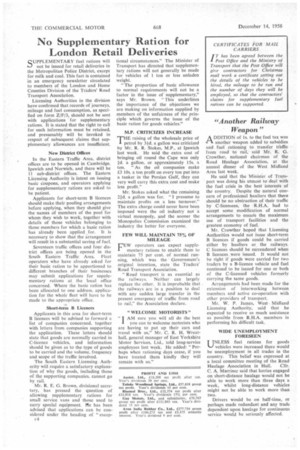"Another Railway Weapon
Page 44

If you've noticed an error in this article please click here to report it so we can fix it.
ADDITION of is. to the fuel tax was
. another weapon added to subsidies and fuel rationing to transfer tfaffic from road to rail, said Mr. R. G. Crowther, national chairman of the Road Haulage Association, at the annual dinner of the West Midland Area last week.
He said that the Minister of Transport was doing his utmost to deal with the fuel crisis in the best interests of the country. Despite the natural concern of professional hauliers that there should be no abstraction of their traffic by C-licensees, the R.H.A. had to accept some modification of normal arrangements to enside the maximum use of transport facilities and the greatest economy of fuel.
Mr. Crowther hoped that Licensing Authorities would not issue short-term B licences if goods could be carried either by hauliers or the railways. C licences should be surrendered when B licences were issued. It would not be right if goods were carried for two traders by a B-licence vehicle and fuel continued to be issued for one or both of the C-licensed vehicles formerly carrying the same goods.
Arrangements had been made for the extension of interworking between members and active co-operation with other providers of transport.
Mr. W. P. James, West Midland Licensing Authority, said that he expected to receive as much assistance as possible from R.H.A. members in performing his difficult task.
WIDE UNEMPLOYMENT FORESEEN FINLESS fuel rations for goods Li vehicles were increased there would be unemployment in all trades in the country. This belief was expressed at a local committee meeting of the Road Haulage Association in Hull. ClIr. C. A. Marriner said that lorries engaged on short-distance haulage would not be able to work more than three days a week, whilst long-distance vehicles might not be able to work more than two.
Drivers would be on half-time, or perhaps made redundant and any trade dependent upon haulage for continuous service would be seriously affected.
















































































































